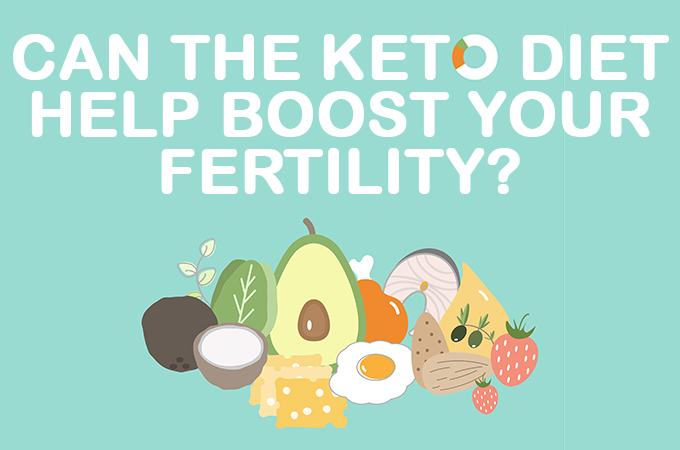Many patients ask, “Is the keto diet safe?” “Can it help boost my fertility?” Let’s take a closer look.
Unlike other low-carb, high-protein weight loss diets, like Atkins and Paleo, the ketogenic “Keto” diet is a strict, high-fat, medical diet that has been used for decades to reduce frequency of seizures in children with epilepsy. Because the ketogenic diet requires 70-80% of calories from fat, 15-25% of calories from protein and only 5-10% of calories from carbohydrate, it has emerged as both controversial and risky.
While studies have found the keto diet can improve insulin sensitivity (lowering total insulin levels), reduce triglycerides, improve HDL cholesterol levels, suppress appetite and result in quick weight loss, this high-fat, low-protein and even lower carbohydrate diet is extremely restrictive and not sustainable long-term. It requires near elimination of multiple nutrient dense food groups like fruits, starchy vegetables, whole grains and beans which can potentially lead to detrimental nutrient deficiencies, including potassium, selenium, magnesium, phosphorus and vitamins B and C.
Inadequate fiber intake is another concern which can significantly impact gut health and lead to constipation or diarrhea.
By requiring ingestion of so much saturated fat, far exceeding the U.S. Dietary Guidelines recommended 10% of total calories per day, the keto diet has been found to increase LDL (bad) cholesterol levels which is a risk factor for cardiovascular disease. Additionally, studies suggest there is a higher risk for developing kidney stones.
Rapid weight loss inevitably leads to a decrease in both fat mass and lean muscle mass. Loss of lean muscle mass can potentially decrease metabolic rate which in turn, greatly increases the likelihood of weight regain once stopping the diet, especially without resistance training and regular exercise to help rebuild muscle mass. When it comes to fertility, there is insufficient data suggesting the keto diet is safe during pregnancy.
The body’s primary source of fuel is glucose (sugar) found in carbohydrates like fruits, vegetables, grains and beans. During times of fasting or starvation, when there is inadequate carbohydrate consumption, the body begins to use a different type of fuel as a survival mechanism. The keto diet intentionally mimics a state of fasting by reducing carbohydrate so low, only allowing for ~20-50g carbohydrate per day, the body is forced into using fat for energy. This metabolic process is called ketosis and occurs as the liver utilizes fat and produces ketone bodies for energy. When following the diet properly, one must monitor for ketones (via urine, breath or blood test) to ensure their body remains in ketosis.
To eat this much fat and not consistently be in ketosis would be detrimental to weight loss efforts and health in general. So, having a “cheat day” or sneaking a few extra bites of fruit, a slice of bread or heaven forbid a cookie, could be enough to flip the switch and stop the fat burning ketosis process. This is a real concern for patients with an all or nothing mentality or those who have struggled with disordered eating, emotional eating and already have a delicate relationship with food. Like many other unsustainable restrictive plans, the keto diet’s extreme limitations may be a trigger to binge, give up and eventually lead to weight regain.
A Fertility Friendly Diet
As a woman embarks on the path to motherhood, she should be nourishing her body–not inducing a state of metabolic starvation like ketosis. In contrast to the keto diet, a fertility friendly diet is nutrient dense, low-glycemic and anti-inflammatory. While it is important to focus on incorporating protein and healthy fats and eliminating processed carbohydrates and added sugars, it is equally important to balance your diet with nutritious fruits, starchy vegetables, legumes and whole grains. These healthy carbohydrates provide essential micronutrients to naturally promote fertility.
For instance, whole grains and legumes provide B-vitamins which are crucial for optimal egg development and ovulation. Folate, another B vitamin, found in vegetables, fruits, dairy and grains, is essential for fetal development and prevention of neural tube defects. Berries and cherries are packed with strong antioxidants that combat inflammation in the body and protect cells against oxidative stress. Beans and lentils are good sources of protein, potassium and folate and while they do have carbohydrates, they’re net carbohydrate load (net carb = total carbohydrate – dietary fiber) is low because they’re packed with fiber. Soluble fiber from whole grains and legumes help bind excess hormones and cholesterol so the body can excrete them instead of absorbing them. It also attracts water to stool which can improve bowel regularity and prevent constipation. If you know grains are a trigger for you, possibly causing bloating, brain-fog, or more cravings, it’s perfectly safe to remain grain-free and still eat a fertility friendly diet by incorporating fruits, legumes and starchy vegetables.
While it’s tempting to get caught up in glamorous social media diet crazes, testimonials from your favorite heath blogger and the dramatic claims marketed by fad diets, it’s important to remember there is no perfect diet and no one diet is right for everyone. If you look closely, extreme and restrictive diets, from vegan to Keto, claim to have many of the same health promoting outcomes, yet they couldn’t be more polar opposite. Makes you wonder, right?
To watch our On-Demand Webinar on Weight and Fertility, click here. During this free, on-demand event, viewers will learn about the impact weight, either over or under, has on the ability to conceive and tips for maintaining and achieving a healthy body mass index (BMI).

More About Meghan Sylvester, RDN, LDN
Meghan is a registered and licensed dietitian nutritionist who believes in the healing power of “real food”—the less processed the better. Meghan loves food and is passionate about teaching others how our diet is directly connected to hormonal balance, nutritional health, and general well being. She understands the rigors of fertility treatments and is dedicated to coaching women how to nutritionally prepare their bodies for improved cycle outcomes and to carry a healthy pregnancy. Meghan received her bachelor’s degree in Nutrition and Dietetics from the University of Delaware and went on to complete her clinical internship rotations at the Johns Hopkins Hospital in Baltimore, Maryland. She is eager to continue her studies in Integrative and Functional Nutrition to further broaden her scope of practice.
REFERENCES






